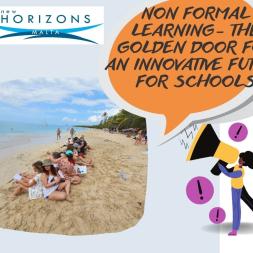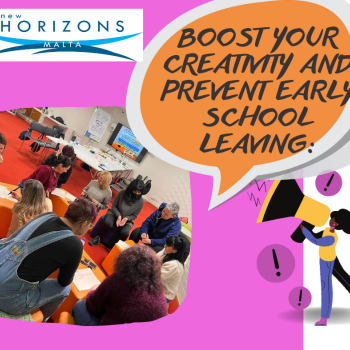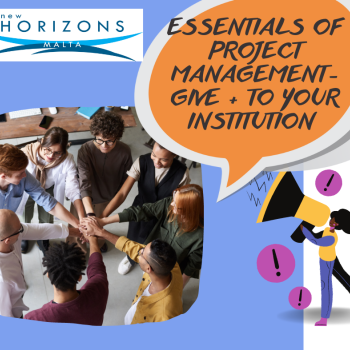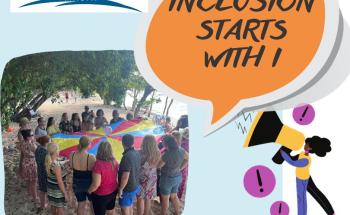
NON FORMAL LEARNING– THE GOLDEN DOOR FOR AN INNOVATIVE FUTURE FOR SCHOOLS- 20204-2025
he course aims is to foster excellence and innovation in education by equipping teachers and education staff with the basic knowledge and skills to integrate non forma learning methods/ activities in their education programmes.
8 training days format but at your request, the course can be structured for a shorter format of 7,6, or 5 days
Description
The programme is designed on learning modules. The detailed agenda will be given after pre-registration.
1 .INTERCULTURAL SETTINGS. Networking activities: Connection between cultures. Education For All. A global commitment. Show me your class and I will tell you who you are.
2 NON FORMAL EDUCATION. Comparing formal and non-formal learning; Practicing, designing and delivering non-formal activities and tool. Basic concepts and principles about non-formal education: debate
3. MOTIVATION: How to foster students’ motivation, participation and creativity through non-formal, informal and experiential learning activities; The extra benefit of using non-formal education methods in a multicultural environment;
4. COACHING: Coaching for non formal learning- Need and importance. The basic elements of coaching- coaching models. Teacher versus mentor versus coach: debate
5.NON FORMAL FOR INCLUSION: The importance of inclusive education; The basic elements of inclusive education; The support of inclusive education; Social theatre, human library and improvisation as educational tools; The extra benefit of using non-formal education methods in a multicultural environment
6. EU COMPETENCES : Key competences and skills for the 21st Century; the recognition of non-formal education competencies ;Thematic visit to school/non formal education centre
7. LEARNING BY DOING: Group dynamics; Collection of experiential workshops on Icebreakers, Warm-ups, Role plays, Open-ended problem drama, Critical incidents, Demonstrations, Panel discussions, Fishbowl, Team-building, storytelling, etc
8. OUTDOOR EDUCATION: Benefits and principles; Planning and delivering ONE DAY OUTDOOR CLASSROOM concept
Planning the follow up: future projects together. Course evaluation. Releasing of official course certifications and Europass Mobility documents.
if your project is already approved enroll here: NEW HORIZONS MALTA Erasmus sessions 2023/2024 (google.com)
Learning objectives
to understand the consequences of applying the non formal methods regarding students' motivation;
-to learn new non formal activities, tools, methods and to share best practices
- to understand non-formal education principles, within the context of cooperative learning, blended learning;
-to use experiential learning in their activities in order to increase student motivation and enthusiasm to learn;
-to encourage teachers to use these methods to support and motivate the students and to make the lessons more attractive;
- to develop a greater understanding of the differences between formal, non-formal and informal learning as well as the basic non-formal education principles;
-to learn how to use outdoor education for personal, social and relational development (e.g. self.confidence, team building, leadership…);
- to learn more about the emerging trend of integrating non-formal working methods in formal education pathways;
- to practice and add to their know-how concrete non-formal activities, working methods and tools transferable into practice;
- to deeper understanding into the dynamics that happen between groups;
-to encourage teachers to be creative and to do all the best to boost the creativity of their students;
-to become aware of the role of personal and professional development as a quality factor in teaching process.
All our courses includes at least one VISIT TO LOCAL SCHOOL and the opportunity to interact with LOCAL TEACHERS
Methodology & assessment
Certification details
At the end of the course, each participant will be awarded with the Europass Mobility Certificate, together with a descriptive certificate of attendance ( on the certificate will be specified the title of the course, name of the participant project, national reference number, numbers of hours, course dates and location). after participants enrollment, we provide also the learning agreement and the interinstitutional agreement. PREPARATION AND FOLLOW UP BEFORE:Every participant will have to fill a questionnaire which helps the trainers to customize the course to better fit their needs. Attendants will get instructions and material which will help them to be prepared for the courses needs. AFTER: The participants will get material which includes information about all the areas covered at the course, lesson plans , all the produced outcomes of the course, useful links and more. ON THE LAST DAY OF THE COURSE THE PARTICIPANTS WILL HAVE THE OPPORTUNITY TO CREATE A DRAFT OF FUTURE ERAMUS SMALL SCALE PROJECT AND DESIGN SUPPORT WILL BE GIVEN
Additional information
-
Language:English
-
Target audience ISCED:Primary education (ISCED 1)Lower secondary education (ISCED 2)Upper secondary education (ISCED 3)
-
Target audience type:TeacherHead Teacher / PrincipalTeacher Educator
-
Learning time:25 hours or more
Upcoming sessions
Past sessions
More courses by this organiser

BOOST YOUR CREATIVITY AND PREVENT EARLY SCHOOL LEAVING: STEPS FOR INTEGRATION AND INTERCULTURAL EDUCATION

ESSENTIALS OF PROJECT MANAGEMENT- GIVE PLUS TO YOUR INSTITUTION WITH QUALITATIVE STANDARDS OF PMI


